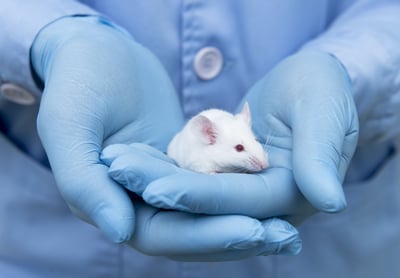FORCE's eXamining the Relevance of Articles for You (XRAY) program looks behind the headlines of cancer news to help you understand what the research means for you.
XRAY is a reliable source of hereditary cancer research-related news and information.
Learn more about the XRAY program
Categories Metastatic Cancer
Article : Promise of a cure for cancer is too good to be true
Most relevant for: People diagnosed with cancer
The Jerusalem Post published an article titled, “A cure for cancer? Israeli scientists may have found one.” The story profiled a small Israeli company called Accelerated Evolution Biotechnologies that has been working on developing new cancer treatments since 2000. The article relied almost entirely on an interview with the company’s chairperson of the board who made a series of unsubstantiated claims that included that, in a year’s time, the company will offer a complete cure for cancer. (2/12/19)
Read More
Relevance: High


Strength of Science: Medium-High


Research Timeline: Post Approval


Study : The impact of palbociclib (Ibrance) on overall survival for metastatic breast cancer patients in the PALOMA-3 trial
Relevance: High


Strength of Science: Medium-High


Research Timeline: Post Approval


Most relevant for: People with metastatic, hormone-positive breast cancer
The PALOMA-3 clinical trial showed that a new CDK4/6 inhibitor in combination therapy improved progression-free survival of women treated for hormone receptor-positive, HER2-negative advanced or metastatic breast cancer in women with prior disease progression after endocrine therapy. This XRAYS reviews a newly published study in the New England Journal of Medicine that looks at overall survival in the original PALOMA-3 study. (1/23/19)
Read More.jpg)
Relevance: Medium-High


Strength of Science: Medium


Research Timeline: Human Research


Study : Immunotherapy may lead to long-term remission of metastatic breast cancer
Relevance: Medium-High


Strength of Science: Medium


Research Timeline: Human Research


Most relevant for: People with advanced cancers
Metastatic breast cancer is often difficult to treat. In a new approach, called adoptive cell therapy (ACT), a patient’s own T-cells (a type of cancer-fighting immune cells) are collected, multiplied in a lab, and then returned to the patient. The goal is to enhance the patient’s immune system with many more T-cells that recognize and attack metastasized tumor cells. This study reports on a single patient whose metastatic breast cancer is still in remission (no evidence of disease) after more than 22 months following ACT. (8/16/18)
Read More
Relevance: Medium


Strength of Science: Medium-High


Research Timeline: Human Research


Study : Metastasis is affected by wound healing and inflammation in study on mice
Relevance: Medium


Strength of Science: Medium-High


Research Timeline: Human Research


Most relevant for: Cancer patients who will be, or have recently undergone surgery
This study in mice looked at how wound healing after surgery affects metastasis. Researchers found that wound healing caused changes in the mouse immune system that allowed some cancer cells to grow, but that treatment with a non-steroidal anti-inflammatory drug (NSAID) reduced inflammation and frequency of metastases. While this research is promising, it remains to be seen if similar effects occur in humans. (5/17/18)
Read More
Relevance: Low


Strength of Science: Medium


Research Timeline: Animal Studies


Study : Is asparagus linked to breast cancer metastasis?
Relevance: Low


Strength of Science: Medium


Research Timeline: Animal Studies


Most relevant for: People diagnosed with breast cancer
A study published in the journal Nature shows that asparagine, a protein building block that takes its name from asparagus, promotes the spread of breast cancer in mice. The study by cancer experts from Britain, Canada and the U.S. investigated whether limiting the levels of asparagine in mice could reduce tumor metastasis. (3/2/18)
Read More
Relevance: Medium-Low


Strength of Science: Medium-Low


Research Timeline: Animal Studies


Study : Cancer “vaccine” injected directly into tumors works in mice
Relevance: Medium-Low


Strength of Science: Medium-Low


Research Timeline: Animal Studies


Most relevant for: People with advanced cancers
Immunotherapy is treatment that uses the immune system to fight cancer. Still in its infancy, it is a promising therapy that is changing how certain cancers are treated. A new study reports that tumors in lab mice were eliminated when they were injected with two immune system-enhancing agents. This new approach is called in situ (at the original site) vaccination because the injections are given directly into the tumors. It worked on several different types of mouse tumors, including lymphomas and breast tumors. This approach may be safer than conventional immunotherapy because it uses very low doses of the agents and it does not require tumors to have particular markers. (02/23/18)
Read More
Article : Coping with the financial burden of breast cancer
Most relevant for: People diagnosed with breast cancer
U.S. News & World Report recently talked to three breast cancer survivors, including two young women, about how they handled out-of-pocket costs and other medical expenses after their cancer diagnosis. (Posted 1/4/18)
Read More
Relevance: Medium-Low


Strength of Science: Medium


Research Timeline: Animal Studies


Study : Can chemotherapy before surgery fuel breast cancer metastasis?
Relevance: Medium-Low


Strength of Science: Medium


Research Timeline: Animal Studies


Most relevant for: Newly diagnosed breast cancer patients
Some breast cancer patients are given neoadjuvant (before surgery) chemotherapy. However, some recent studies have raised concerns that neoadjuvant treatment might actually trigger cancer spread in certain situations. In the current study, researchers used mouse models and human breast cancers to explore this possibility. (10/10/17)
Read More
Article : FDA busts myths of preventing and treating cancer by eating apricot kernels, herbs, and other ingredients
Most relevant for: People diagnosed with or concerned about their risk for cancer
Maggie Fox (NBC News) writes about a new FDA report that warns of 14 "fraudulent” cancer products claiming to either cure or treat cancer (1). The companies that sell these products claim that many of them also prevent cancer, but are they safe or effective? (6/26/17)
Read More
Relevance: Medium-Low


Strength of Science: Medium-High


Research Timeline: Animal Studies


Article : Does metastasis happen earlier than previously thought?
Relevance: Medium-Low


Strength of Science: Medium-High


Research Timeline: Animal Studies


Most relevant for:
Sharon Begley discusses an unconventional new idea about how cancer cells spread (a process known as metastasis) in her recent piece for the website STAT. She states that, “cancer cells spread way earlier than thought, seeding metastases that cause most deaths.” (3/28/17)
Read More